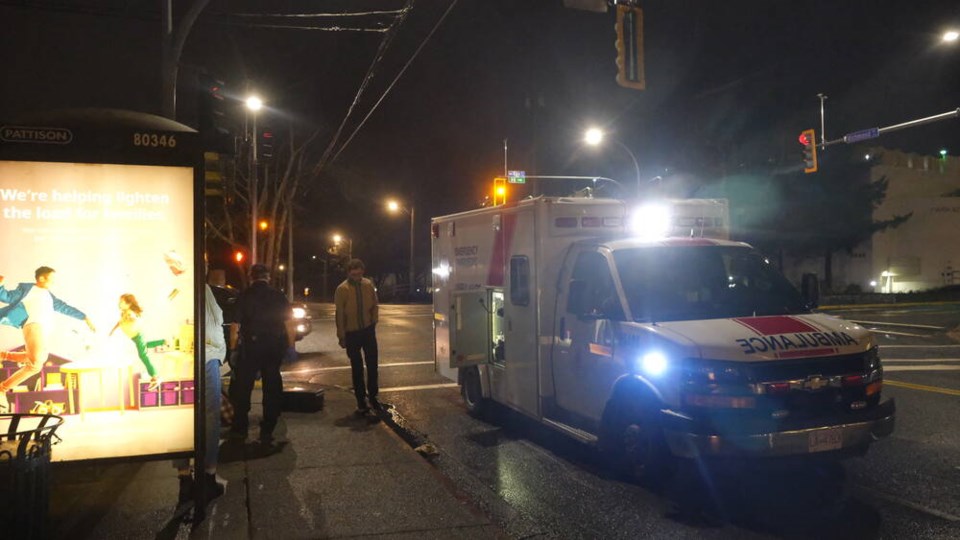Island Health says it’s reviewing ER discharge practices at Royal Jubilee and other hospitals across the Island, after reports of vulnerable unhoused patients being left by security staff at bus stops.
“We are reviewing our processes to ensure they are reflective of Island Health’s values and standards,” the health authority said Friday. “This includes a review of emergency department discharge processes.”
The health authority said it will work with front-line care providers, medical staff and support staff “to ensure they have access to the information and resources they need to provide the best care possible to our patients.”
Neighbouring resident Julianna Nielsen told the Times Colonist recently that every week, she sees discharged patients in hospital gowns, blankets, wristbands or carrying bags brought to or ending up at a bus stop outside Royal Jubilee Hospital, where they sometimes pass out or collapse.
Most appear to be unhoused, said Nielsen, who reported seeing a woman taken by four security guards to a bus stop as recently as Sunday evening.
Victoria resident Carol Petigrew told the Times Colonist this week that she witnessed a distraught young woman ejected from Saanich Peninsula Hospital, escorted by two security guards, and left at a bus stop “while a number of staff looked on in consternation.”
The young woman’s belongings were falling out of a paper bag, she kept walking out of her shoes, and she did not have a coat despite the cold, Petigrew said.
“She ran from the bus stop and disappeared somewhere past the parking lot,” said Petigrew in an open letter to Health Minister Adrian Dix.
Petigrew said she can’t get rid of the memory of what she witnessed.
“How is it in this province of peace and prosperity, our government cannot provide a safe and caring place for the mentally afflicted that will also assure safety and security for those with the skill to care for them?” she wrote.
B.C. Premier David Eby said Thursday that both Island Health and Vancouver Coastal Health are looking into recent complaints about the discharge process to determine what policies or procedures could be contributing.
A Vancouver resident went public with similar accounts of patients being dumped at a bus stop outside Vancouver General Hospital.
“These are deeply disturbing stories that we’re hearing about about people who have gone to the hospital for care and are being left at bus stops in distress,” said Eby. “Our expectation is that health authorities will continue their work looking into these and addressing the issue to make sure that if there’s an additional role the province needs to play — in terms of supports for people who are being discharged — that we’re closing that loop and meeting the needs of people as best as possible.”
The Health Ministry said for patients who are deemed medically ready to be discharged but have unstable housing, health teams that include social workers co-ordinate with patients or family, support networks or community partners to develop a safe discharge plan.
That could include connecting with housing supports or shelters, the ministry said.
Eby said it’s unclear if the recently highlighted discharge issues are related to ongoing problems with people who are violent or disruptive in emergency rooms and need to be removed because they threaten the safety of other patients and staff, but that’s something health authorities will look at as part of their review.
Island Health said its Protection Services Officers are not generally involved in the discharge process, but in some instances, based on patient behaviour, security guards may be called to assist if the safety of staff or other patients is at risk.
Nielsen, whose apartment is across from a hospital bus stop, said the discharged patients she sees on the street rarely appear physically threatening. “I observe many people who appear to require assistance to sit or stand.”
Grant McKenzie, spokesperson for Our Place Society, which provides supports including shelter for people in need, said there’s just not enough supportive housing for people dealing with severe mental illness.
“They need to be in an Island Health facility and I assume there’s not enough facilities,” said McKenzie.
If a patient is deemed a threat to themselves or others, they’ll typically be admitted to a mental health bed.
“But they don’t seem to have any [more] space where they can put people where they have 24/7 supported housing,” said McKenzie. “And I think that’s the big disconnect.”
People discharged at night from the ER are sometimes brought to Our Place, but McKenzie said they are not necessarily equipped to accommodate people with severe mental-health issues.
Outreach workers are compassionate and caring but they are not mental-health nurses or psychiatrists, he said, arguing Island Health is better equipped to deal with such patients than non-profits.
In its statement on Friday, Island Health said discharge plan should include “compassionate patient support.”
Working with patients with extremely complex care needs and social issues such as unstable housing can be challenging for staff, the health authority said, noting any form of violence or harassment is not tolerated.
BC United Health Critic Shirley Bond said staff and hospital safety, as well as ER discharge and follow-up care plans for people who might be unhoused, must be examined thoroughly.
No one wants violent or unruly people disrupting crowded ERs, said Bond. “We need hospitals and ERs to be safe places for our health-care professionals to do their jobs and heaven knows they are challenging enough.”
But Bond said it’s essential that there be a strategy across all heath authorities to make sure that when someone is discharged from hospital, an appropriate plan is in place, particularly for the unhoused.



